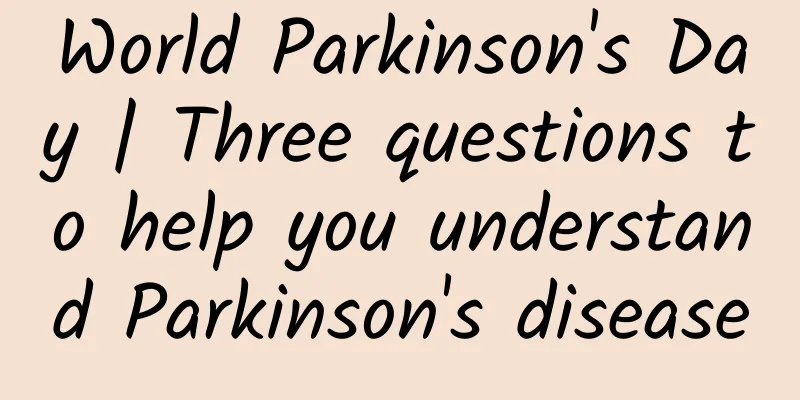World Parkinson's Day | Three questions to help you understand Parkinson's disease

|
April 11 is "World Parkinson's Day" and this year's theme is "Pay attention to mental health and comprehensive and full management." Parkinson's disease, also known as tremor paralysis, is caused by the degeneration of brain neurons. Parkinson's disease is a chronic neurodegenerative disease that occurs frequently in the elderly. Its typical clinical manifestations include resting tremor, bradykinesia, muscle rigidity, and posture and gait disorders. In addition to common motor symptoms, Parkinson's disease patients also have non-motor symptoms such as anxiety, depression, sleep disorders, loss of smell, cognitive impairment, paresthesia, and urinary and bowel disorders. The most common non-motor symptoms of Parkinson's disease patients are anxiety and depression. About 70% of Parkinson's patients have anxiety symptoms, often feeling nervous, restless, etc.; about 50% have depression symptoms, often manifested as decreased interest, loss of appetite, fatigue, crying, anxiety, insomnia, feeling useless and incompetent, low self-esteem, etc., and in severe cases, suicidal tendencies may occur. Due to the hidden onset of Parkinson's disease, the early diagnosis rate of Parkinson's disease is only 26%, so many Parkinson's patients miss the best time for intervention treatment. Clinical practice studies have found that timely identification of symptoms is the key and basis for improving early diagnosis of Parkinson's disease patients and can avoid delayed treatment. Hand tremor ≠ Parkinson's disease Hand tremor, also known as tremor, refers to the rhythmic involuntary movement of the hand caused by the alternating or synchronous contraction of the agonist and antagonist muscles. Usually, people think that hand tremors in the elderly are caused by Parkinson's disease. In fact, hand tremors ≠ Parkinson's disease, because there are many other reasons for hand tremors. Physiological tremor: It usually occurs when a person is nervous, angry or excited. It usually manifests as uncontrollable shaking of the hands. Once the cause of the hand tremor is eliminated, the symptoms will disappear quickly. This situation does not require special treatment. Try to avoid the cause, exercise moderately, and keep a relaxed mind. Essential tremor: includes senile and familial tremor. Senile tremor generally refers to benign tremor caused by the decline of some regulatory functions of the nervous system as the elderly age. Familial tremor usually has a family history. Essential tremor usually manifests as involuntary shaking of the hands, head and mandible, which worsens when nervous and relieves when still or after drinking. However, patients usually do not have symptoms such as limb stiffness and slow walking. If it does not affect daily life, no drug treatment is required. Drug-induced tremor: generally refers to tremors caused by taking certain special drugs, usually occurring in both hands at the same time, and can be manifested as static or action tremors. The hand tremor symptoms usually disappear or decrease after stopping the drug. Common drugs that can cause this symptom include haloperidol, etc. Hyperthyroidism: This type of hand tremor is usually caused by hyperthyroidism, and the patient will also have symptoms of high metabolism such as heat intolerance, sweating, fatigue, hunger, weight loss, palpitations, and panic. The patient can be diagnosed by taking a blood test for thyroid function. Comprehensive intervention is important So far, Parkinson's disease is still an incurable disease, but there are many treatments that can relieve patients' clinical symptoms and improve their quality of life. For example, drug therapy, deep brain stimulation pacemaker surgery, "magnetic wave knife" treatment, transcranial repetitive magnetic stimulation treatment, rehabilitation training, etc., all of these treatments can effectively relieve the movement disorders of Parkinson's patients. At the same time, psychological disorders such as anxiety and depression exist at any stage of Parkinson's disease, and are more obvious in the early and late stages of the disease. They can not only accelerate the progression of the disease, but also seriously affect the patient's treatment compliance and aggravate the patient's motor symptoms. Therefore, scientific psychological adjustment treatment should run through the entire process of diagnosis and treatment of Parkinson's disease patients, which requires the joint efforts of doctors, patients and families. Help patients correctly understand Parkinson's disease, overcome their fear, and increase their confidence in defeating the disease. Keep patients relaxed and optimistic, get enough sleep, and exercise more. Let the patients do some housework within their ability and cultivate their hobbies such as listening to music, reading newspapers, and growing flowers and plants. Encourage patients to participate in social activities and overcome inferiority complex. In severe cases, anti-anxiety and anti-depressant drugs can be added, and cognitive behavioral psychotherapy can also be used as an aid. Scientifically understanding Parkinson's disease and comprehensively fighting it can effectively delay the progression of Parkinson's disease and improve the quality of life of patients. Be alert if you have the following symptoms If you experience the following symptoms, you need to be alert to Parkinson's disease. It is recommended that you seek medical attention in time for early diagnosis and treatment! 1. Hand tremors The hand tremor symptoms of Parkinson's disease patients are usually resting tremors, that is, the hand tremors are obvious when the patient is sitting and resting, and the hand tremors will be significantly reduced when working, and will disappear when sleeping. The typical manifestation is the "pill-rolling" or "money-counting" movements of the thumb and index finger. Usually one side of the limbs will be affected first, and the symptoms will be aggravated when nervous or excited. 2. Limited limb movement They often feel stiff limbs, tight muscles, and inflexibility, and their movements become slower, such as difficulty buttoning and tying shoelaces, smaller and slower steps when walking, and reduced coordinated limb swing. 3. Loss of sense of smell About 90% of Parkinson's disease patients will experience hyposmia in the early stages. Some patients may experience hyposmia 3 to 7 years before motor symptoms appear. It is one of the typical symptoms of Parkinson's disease in the early stages. 4. Sleep disorders It is manifested by frequent shouting, punching and kicking while sleeping. This is a special sleep disorder - rapid eye movement sleep behavior disorder, also known as "sleep disorder". 5. Write smaller Long-term and continuous writing that makes the handwriting smaller and smaller is also called "lower case sign". 6. Mask face In the early stages, it is often manifested as reduced facial expressions, fewer smiles, reduced blinking and eye movements, and in the later stages it will present as a "mask face." 7. The sound becomes smaller It usually manifests as a low, unclear speaking voice, lower volume and decreased clarity. 8. Constipation Parkinson's patients often have difficulty defecating if they do not take special foods or medications. Studies have found that the incidence of constipation in Parkinson's patients is three times that of non-Parkinson's patients. |
<<: "Losing weight" is a big deal! These 6 wrong ways to lose weight may ruin you
>>: Treating osteoporosis cannot be done with just calcium
Recommend
Symptoms of failed cerclage
For many couples, having a baby of their own is a...
Leucorrhea with blood after spontaneous abortion
Spontaneous abortion refers to a miscarriage caus...
What is the difference between blanching carrots and not blanching them? Benefits and functions of carrots
Carrots have a high reputation in the West and ar...
Is pelvic inflammatory disease adnexitis?
Pelvic inflammatory disease is a gynecological di...
How to prevent potential "brain stealers"? Do not eat raw food to avoid parasitic infection
Recently, according to foreign media reports, doc...
Why do I feel pain in my chest and back during late pregnancy?
As we all know, pregnancy is very hard for women....
How much do parents know about nebulization?
This is the 5351th article of Da Yi Xiao Hu...
Vulvar dryness and itching
The most common diseases that occur in women are ...
What causes swelling on a woman's face?
Many women will find that their faces have become...
Does ovulation usually occur during the day or at night?
Mothers have a very hard time during pregnancy, b...
What should I do if the incision hurts after one month of cesarean section?
We all know that childbirth is a very harmful pro...
What are the benefits of West Lake Longjing tea? What are the tips for preserving West Lake Longjing tea?
West Lake Longjing tea can make people full of en...
Women's safe period
There are many ways for women to prevent pregnanc...
Can pregnant women soak their feet?
Foot soaking is a very good way to maintain healt...
Is there any mother who vomited blood?
Morning sickness is a normal physiological phenom...









